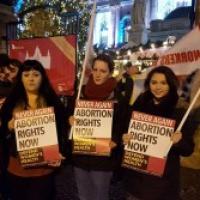
Movement needed for women’s rights
On 30 November, in a landmark case, Belfast High Court ruled that Northern Ireland’s archaic abortion laws contravene human rights and that terminations should be permitted in cases of fatal foetal abnormality and where pregnancy is the result of sexual crime.
Up until now, abortion has been all but banned, except in circumstances where the woman’s life or long-term health is directly at risk. Around 1,000 women travel from Northern Ireland to Britain every year to access abortions, costing each several thousand pounds.
The case was taken following public outcry against the treatment of Sarah Ewart. In 2013, this young woman found out she was carrying a foetus with anencephaly – a condition where the skull and brain do not properly form – and had no chance of survival after birth.
Disgustingly, Sarah was told that she could not have an abortion in Northern Ireland under existing rules and would have to carry the foetus to term. Rather than go through that unimaginable ordeal, she chose to travel to England for a termination, adding to her emotional distress.
Abortion in Northern Ireland is governed by the 1861 Offences Against the Person Act but even this 154-year-old legislation should have allowed Sarah Ewart to access a termination. It was the guidelines put in place by today’s politicians in the local Assembly which prevented medical professionals from giving her the treatment she wanted and required!
Sectarian parties united
All the main parties – Unionist and nationalist – are united in opposing a woman’s right to choose. During the negotiations which brought about the 1998 Good Friday Agreement, one of the few things upon which politicians from across the sectarian divide were united was their determination that the 1967 Abortion Act would not be extended from Britain to Northern Ireland.
Unsurprisingly, the Democratic Unionist Party – dominated by religious fundamentalists – remains staunchly opposed to abortion in any circumstances. But even Sinn Féin – which styles itself as a ‘progressive’ party – has only belatedly come to support access to abortion in cases of fatal foetal abnormality this year, with opposition from some leading figures, and remains opposed to abortion rights for rape victims.
These politicians are out of touch with ordinary people, with polls showing a significant majority in favour of dramatically extending abortion rights.
The High Court’s ruling will be appealed by anti-choice groups and face obstruction within the Assembly. An active movement on the streets is the best way to secure this victory and ensure that it is a first step towards winning women’s right to control their own bodies.
The fight for abortion rights must be connected to a broader movement for real choice – for secular sexeducation in a school system currently dominated by the churches; for access to free contraception; for access to free IVF treatment; for jobs, homes and benefits which allow people to provide a decent life for children they do wish to have.

Be the first to comment